1:38:50 PM | 9/20/2024
One of the top criteria for considering OCOP products is that they must have strong local characteristics, be associated with production organization, and form large-scale concentrated commodity production areas and stable material areas. From there, investment in technology can be increased to process and preserve high-quality products.
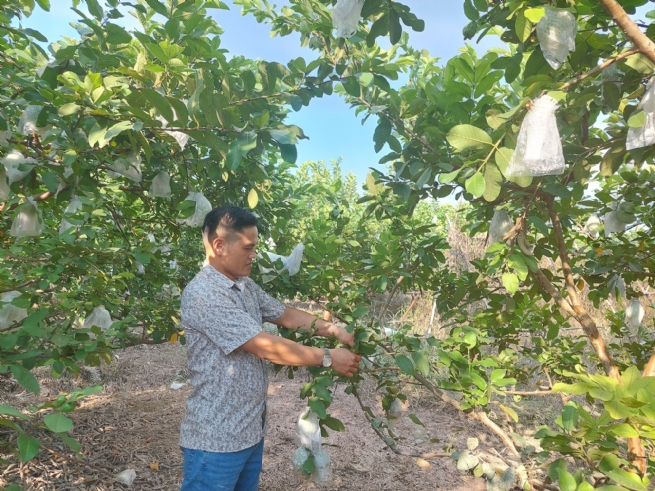
Recently, along with production development, OCOP entities in Hanoi have focused on building material areas, opening up many opportunities for linkage in building production chains. The city is also implementing many solutions to remove difficulties, promote the development of concentrated material areas, and sustainable development.
Elevating local products
After 5 years of implementation (2019-2024), up to now, Hoai Duc district has 114 OCOP products recognized with 3 stars or more, of which 83 products have achieved 4 stars. The products that have been classified and evaluated have promoted their value, brought high economic efficiency, and helped change the production thinking of the subjects participating in the program.
Farmers have also shifted from small-scale production to concentrated production, towards safety, improving designs, building brands and product labels, meeting market demand, and creating more jobs and stable income for workers in their families and localities. The results of the OCOP Program have contributed positively to the overall socio-economic development achievements of the whole district. The district also focuses on supporting subjects participating in the program, from encouraging registration of product ideas, and linking production and consumption, to consulting on upgrading machinery and designing labels and packaging. Currently, the whole district has 44 subjects with products recognized as OCOP.
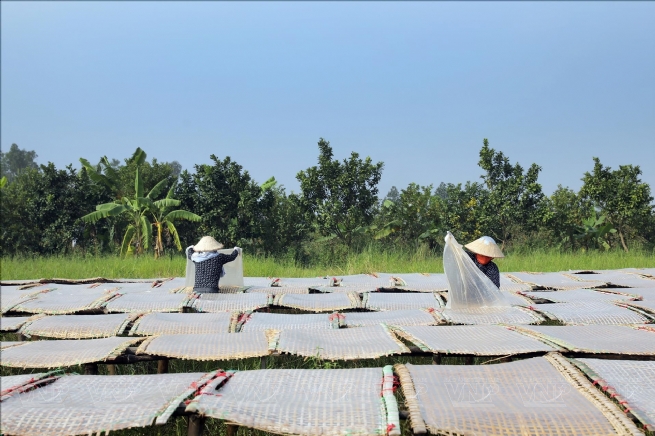
For example, Di Trach Agricultural Service Cooperative, in 2012, the cooperative bought jujube varieties from the Vietnam Academy of Agriculture to plant on an area of nearly 6 hectares. In addition, the cooperative also grows more than 20 hectares of guava and some other fruit trees such as sapodilla and papaya. In 2021, the cooperative registered to participate in the OCOP Program for guava products and was rated 4 stars. Thanks to being included in the system of distributors, supermarkets, and clean stores, the consumption and revenue from guava increased by one and a half times. In 2023, the cooperative continued to register to participate in the OCOP Program for jujube products and was rated 3 stars - Director Nguyen Huu Quang shared. Trung Kien clean vermicelli production and trading facility (Minh Hiep 1 village, Minh Khai commune, Hoai Duc district) is also one of the production facilities in the district that focuses on investing in machinery and technology to produce vermicelli according to a closed chain, so the vermicelli products of the facility ensure food safety, saving a lot of manual production steps in the past. Since 2020, the facility has registered to participate in the OCOP Program for clean vermicelli products and has achieved 4 stars. After 3 years, the product was re-evaluated according to regulations and was awarded a 4-star OCOP by the Hoai Duc OCOP Product Classification Council.
To achieve the above results, the People's Committee of Hoai Duc district has guided and encouraged economic organizations in the district to register product ideas to participate in the program; encouraged cooperatives and enterprises with products to participate in the OCOP program; developed OCOP products from craft villages, traditional craft villages, and communes that meet advanced NTM standards; guided and supported entities to participate in linking production and consumption of products according to the value chain, upgrading machinery and equipment to increase added value.
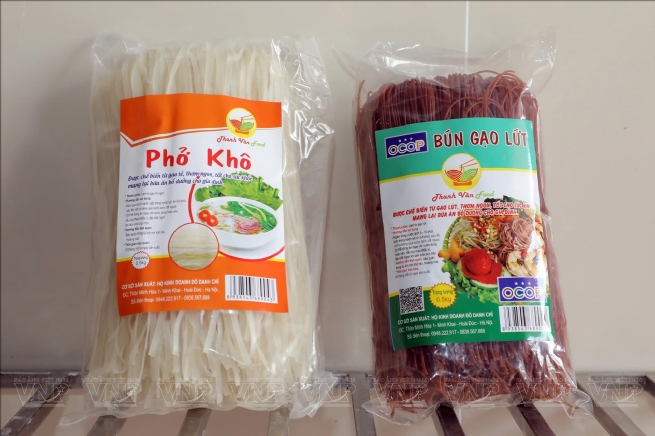
Head of the Economic Department of Hoai Duc District Khuat Trong Kien said: The One Commune One Product (OCOP) program is a rural economic development program, focusing on supporting enterprises, cooperatives, and small and medium-sized production households, aiming to promote traditional values of localities, develop the economy, and improve people's lives.
Building sustainable raw materials
Vice Chairman of Hoai Duc District People's Committee Nguyen Trung Thuan said: The OCOP program aims to increase production value and create brands for products of enterprises, cooperatives, production, and business establishments in Hanoi and contribute to promoting trade, connection, and consumption of products. On that basis, the district has proactively coordinated with the city's departments and branches to build and develop OCOP products; at the same time, opening display, introduction, and sale points of OCOP products to consume and promote the district's OCOP products.
However, in order for consumers nationwide to know and trust in choosing products, contributing to promoting production and business activities in the capital in general, Hoai Duc district in particular, the district hopes that the city's agencies and units will continue to pay attention to and promote OCOP products and points of introduction and sale of OCOP products; helping the district connect and build a chain of production-consumption of products. Along with that, the district will actively encourage, support and support the subjects to focus on further improving the quality of products that have achieved OCOP; and continue to register more products to participate in the OCOP Program, in order to provide the market with quality, safe products and increase income for producers.
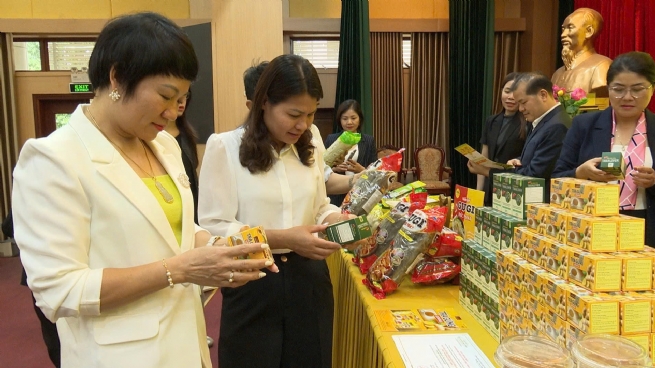
According to Mr. Nguyen Van Chi - Head of the Department of Rural Development, Deputy Chief of the Standing Office, Office of the Coordination of the New Rural Development Program of Hanoi City, the goal of developing OCOP products is to arouse the potential and advantages of rural specialties to increase income for people; contribute to restructuring the agricultural sector associated with small-scale handicrafts, services, and rural tourism.
One of the top criteria for OCOP products is to have strong local characteristics associated with production organization, forming large-scale concentrated commodity production areas, building stable raw material areas, ensuring product supply expanding production scale, and meeting market demand. Hanoi is the capital of the country, a large urban area with rapid urbanization, so raw material areas for production are also a problem for OCOP entities, especially raw materials for producing agricultural products, processed foods, and craft villages.
Towards "sustainability" in OCOP product development, functional sectors and localities of the city need to pay special attention to developing raw material areas. Along with that, OCOP entities also need to proactively improve financial capacity, warehouse systems, production and processing lines and proactively promote trade, put products on e-commerce platforms to open up more opportunities to introduce typical products to consumers.
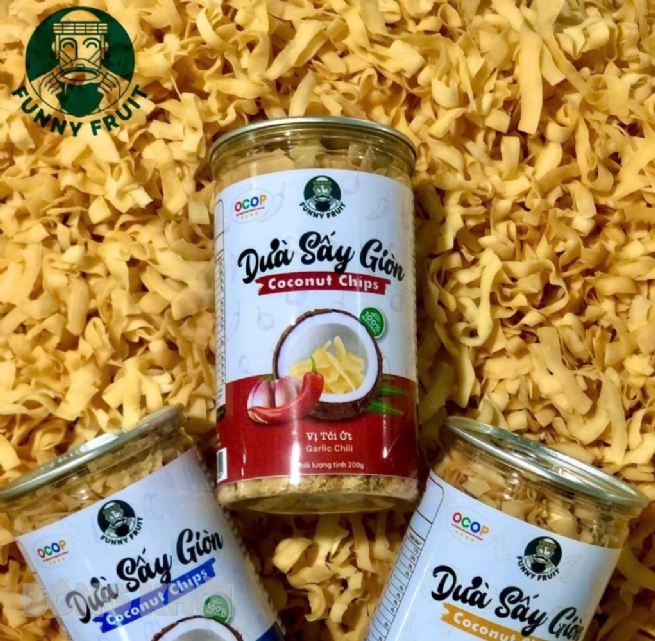
For OCOP products to develop stably and sustainably, in addition to trade promotion and expanding consumption markets, OCOP entities in Hanoi are also concerned about ensuring stable, high-quality, and legal input materials. The difficulty of production entities today is to meet the strict standards of the market and managers in the digital age, especially importers in developed countries. To overcome this, many entities have participated in the linkage model between enterprises and households in several craft villages to convert input materials. In this linkage, enterprises will provide input materials, technology advice, and management methods, and at the same time support the promotion of output product consumption. Typically, support is to promote the formation and development of concentrated, large-scale commodity production areas associated with product preservation, processing, and consumption. At the same time, focus on directing localities to develop products based on the advantages of raw material areas and restore and promote traditional craft villages and occupations, apply solutions on science and technology, and digital transformation to develop and control the quality of raw material areas of OCOP products. Mr. Nguyen Van Chi shared.
By Bao Ngoc, Vietnam Business Forum
The page is coordinated by the Office of the Coordination of the New Rural Development Program of Hanoi City